| Srl | Item |
| 1 |
ID:
132536
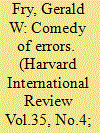

|
|
|
|
|
| Publication |
2014.
|
| Summary/Abstract |
Political crises are nothing new for Thailand. Since becoming a constitutional monarchy in 1932, the country has faced numerous political crises, including a 1973 student revolution to overthrow a military dictatorship, the storming of Thammasat University and the installation of an extremely right-wing government in 1976, and the people power victory over General Suchinda in 1992. In September 2006, a military coup deposed the former prime minister, Dr. Thaksin Shinawatra. In retaliation against the coup, Thaksin supporters in 2006 formed the United Front for Democracy against Dictatorship (UDD), a political pressure group whose supporters are commonly called Red Shirts.
|
|
|
|
|
|
|
|
|
|
|
|
|
|
|
|
| 2 |
ID:
110932
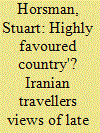

|
|
|
|
|
| Publication |
2011.
|
| Summary/Abstract |
For many years, Iranian views of Britain have been unfavourable. Yet, perhaps counter-intuitively, very positive impressions of Britain were formed by the first small group of Iranians to visit London, nearly two hundred years ago. They commented on everything; constitutional monarchy, politics, foreign policy, economics, society and social issues. In many cases their views of Britain contrasted with their unfavourable views of their own country, reflecting an eagerness to see Iran emulate Britain and embrace Modernisation/Westernisation. Yet their views were not uncritical and they were as accurate and as well-founded as the views of Iran put forward by British observers of Iran like Curzon.
|
|
|
|
|
|
|
|
|
|
|
|
|
|
|
|
| 3 |
ID:
179247
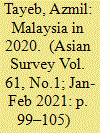

|
|
|
|
|
| Summary/Abstract |
It was a tumultuous year for Malaysia. As the country was experiencing the onset of the first wave of COVID-19 in late February 2020, the majority coalition, the Alliance of Hope (Pakatan Harapan) that formed the federal government at the time broke apart due to defections, symbolized by the so-called Sheraton Move. A new government led by the National Alliance (Perikatan Nasional, PN) coalition came into power after the king appointed its leader, Muhyiddin Yassin, prime minister, replacing Mahathir Mohamad. The PN government immediately faced two severe challenges: the global pandemic threat and the crisis of legitimacy due to weak coalition building. This article mainly focuses on the second challenge, namely the ways the PN government has been able to avoid a parliamentary vote of no confidence and keep its coalition intact, albeit precariously.
|
|
|
|
|
|
|
|
|
|
|
|
|
|
|
|
| 4 |
ID:
133791
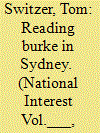

|
|
|
|
|
| Publication |
2014.
|
| Summary/Abstract |
TONY ABBOTT LIKES TO TELL THE STORY about his first visit to the United States as a newly elected member of the Australian Parliament. It was 1995, and he was widely seen as a rising star in the center-right Liberal Party, where the word "liberal" still means more or less what it meant in the nineteenth century. He had also distinguished himself as a leading opponent of the Labor government's ill-fated proposal to replace Australia's constitutional monarchy with a republic.
|
|
|
|
|
|
|
|
|
|
|
|
|
|
|
|
| 5 |
ID:
098407
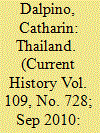

|
|
|
|
|
| Publication |
2010.
|
| Summary/Abstract |
Thailand runs the risk that future protes, a right and a mainstay of liberal democracy, will escalate quickly into violence and eventually be constricted as a matter of course.
|
|
|
|
|
|
|
|
|
|
|
|
|
|
|
|